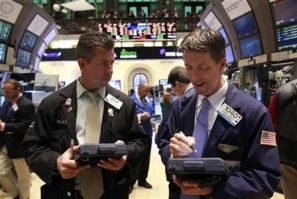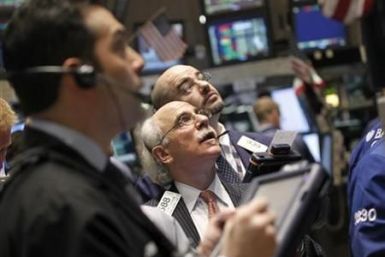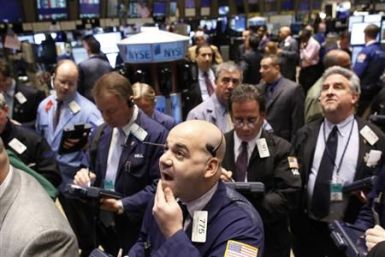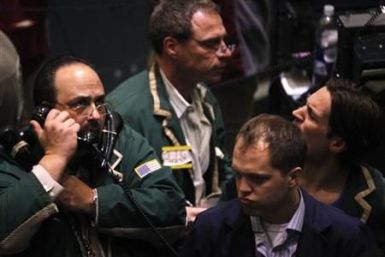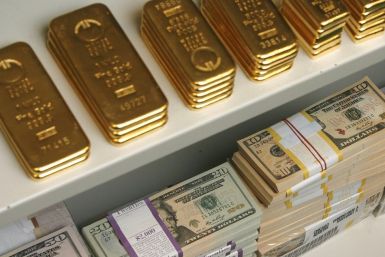Workers in the private sector overall likely will see higher annual wage increases in the coming months, according to the revised first quarter Wage Trend Indicator (WTI) released by BNA.
U.S. stocks ended lower on Tuesday as mounting fears about Japan's escalating nuclear crisis sparked sell-offs in financial markets around the world, but positive remarks from the Federal Reserve helped the indexes rebound from the day’s lows.
U.S. stocks ended lower on Tuesday as mounting fears about Japan's escalating nuclear crisis sparked sell-offs in financial markets around the world, but positive remarks from the Federal Reserve helped the indexes rebound from the day’s lows.
U.S. stocks ended lower on Tuesday as mounting fears about Japan's escalating nuclear crisis sparked sell-offs in financial markets around the world, but positive remarks from the Federal Reserve helped the indexes rebound from the day’s lows.
The U.S. Federal Reserve maintained its ultra-loose monetary policy on Tuesday, saying the economy was gaining traction while flagging potential inflation risks from costlier energy and food.
The Federal Reserve said on Tuesday the U.S. recovery is gaining traction and inflation pressure from soaring energy costs should be short-lived, allowing it to maintain its heavy support for the economy.
The Federal Reserve maintained its ultra-loose monetary policy on Tuesday, saying the economy was gaining traction while flagging potential inflation risks from costlier energy and food.
U.S. stocks plunged on Tuesday, following sell-off in European and Asian stock markets on escalating fears of a nuclear crisis after a radiation leak was detected at the Fukushima Daiichi nuclear plant.
The Federal Reserve looks set to maintain its ultra-loose monetary policy on Tuesday as lofty oil prices and swooning stock markets after Japan's ravaging earthquake raised doubts about the economy's path.
U.S. stocks plunged in early trade on Tuesday, following sell-off in European and Asian stock markets amid fears of a nuclear disaster in Japan.
Manufacturing activity in New York State expanded more than expected in March, reaching the highest levels since June 2010.
U.S. stocks plunged in early trade on Tuesday, following sell-off in European and Asian stock markets amid fears of a nuclear disaster in Japan.
What's your true level of risk today? No idea. But the least your fund manager, advisor or favorite financial columnist can do today is remember the lesson of 2007, and highlight the range of risks and possible fall-out which might lie ahead. Take inflation, for instance. Though small, the risk of currency devaluation and hyper-inflation in the developed West is still materially underpriced by gold bullion
The U.S. Federal Reserve is unlikely to tighten policy by either raising rates or halting the second edition of the asset purchase program known as QE2, when its policy board meets today, according to analysts.
U.S. stock futures point to a sharply lower opening for Wall Street Tuesday, following slump in European and Asian stock markets amid fears of a nuclear disaster in Japan.
The Federal Reserve could tell major banks as soon as next week whether regulators' stress tests show they're healthy enough to boost stock dividends.
The president of the New York Federal Reserve Bank doesn't normally face a raucous crowd.
A top Federal Reserve official signaled on Friday the central bank won't tighten monetary policy any time soon, even as the jobs recovery looked set to quicken.
The Federal Reserve Bank of New York said on Friday it had received American International Group Inc's
offer to buy back residential mortgage-backed securities taken over at height of the financial crisis.The price of gold may touch $5,000 an ounce in the next 4 to 5 years, California-based Capital Gold Group Inc. says.
Surging oil prices are deepening a split inside the Federal Reserve, blurring the likely direction of monetary policy and making next week's policy meeting all the more contentious.
There are no good outcomes, only bad, really bad, and catastrophic. Take your pick. Could gas prices drop below $3.00 per gallon if the world sinks back into recession? Yes. But it would only be momentary. The easy to access supply is dwindling. The medium and long term direction of gas at the pump is up. There is nothing that can be done in the next five years to prevent significantly higher oil prices.




